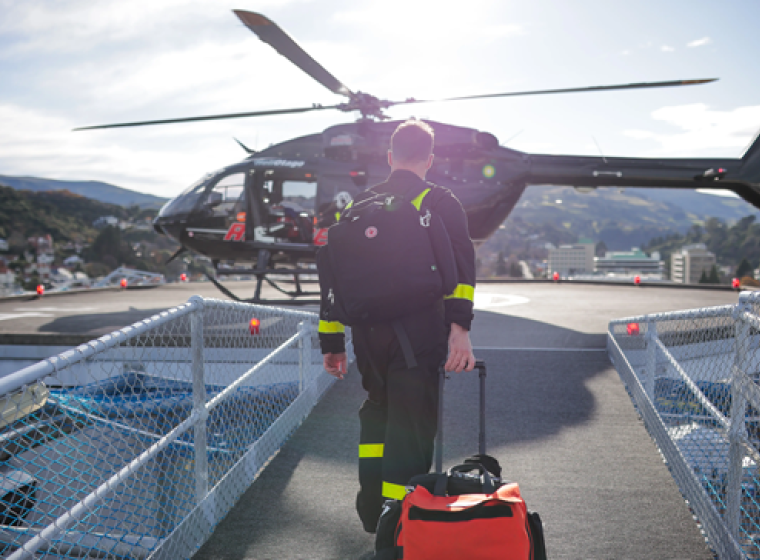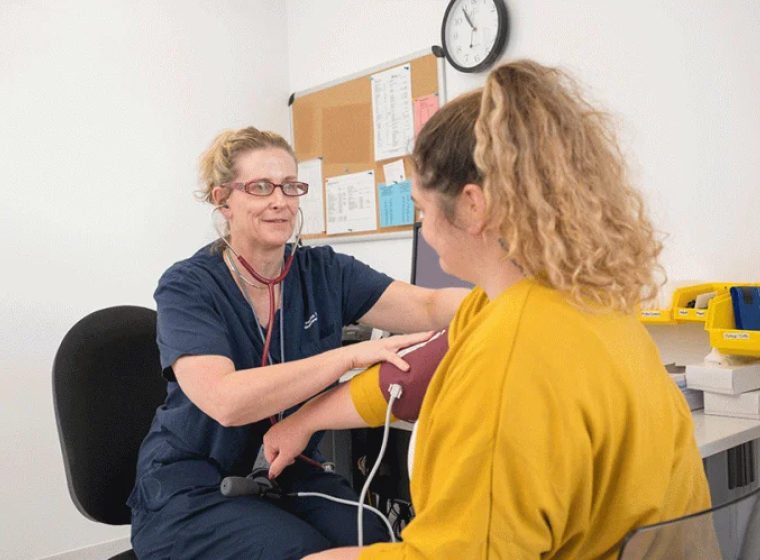Search current vacancies with our districts to apply for.
Nursing in New Zealand
Nursing in New Zealand provides opportunities to be in one of the most respected professions, caring for patients and whānau at their most vulnerable time.
New Zealand nurses are highly respected for the care that they deliver, with a culture that supports career progression and encourages continual growth.
You will be supported to thrive through our many professional development opportunities and have the chance to share your expertise.
Explore our snow-capped mountains hiking or skiing, check out our white sandy beaches with the local wildlife, or visit the local café for brunch. Whatever you are into, you can do it all while working as part of New Zealand largest health workforce.
Getting nursing registration in New Zealand
The Nursing Council of New Zealand has a handy self-assessment tool that can help you understand how to become registered to practice in Aotearoa, New Zealand
Internationally qualified nurses — The Nursing Council of New Zealandexternal link
If you have a diploma
There is a process through the Nursing Council of New Zealand to apply for registration. This will guide you on what will be required.
English language test (IELTS)
In order to register with the Nursing Council of New Zealand, they must be satisfied that you are able to communicate effectively, and that your ability to communicate in and comprehend English is sufficient to protect the health and safety of the public.
If your education led to, or you have current nursing registration in the United Kingdom, Singapore, Ireland, Canada or the United States of America that required you to pass an English language test you may be able to apply for a waiver.
To find out more visit the Nursing Council of New Zealand website.
Nursing Council of New Zealandexternal link
Unions
Employees can choose to join a union. Unions negotiate collective employment agreements and advocate on behalf of employees, working together in the interest of the individual, the collective and the broader community.
Their purpose is to secure jobs, improve terms and conditions of employment, and achieve a better quality of life for workers.
Salary range and additional remunerations
Nurses receive a base salary relative to their level of experience and role — agreed upon at the time of the job offer. The base salary range for a registered nurse is NZD$75,000 to $106,000, and the range for a designated senior nurse is $114,000 to $162,000.
You also get:
- annual salary increments
- set rates for overtime, penal time, and callbacks
- set allowances for on-call, higher duties, shift coordination, duly authorised officers, authorised officers, telephone on-call and meals (where required).
| Nurse | Base salary | Median penal rate | Total1 |
| Graduate RN1 | $75,773 | $921 | $76,694 |
| Middle Step RN4 | $91,179 | $9,831 | $103, 357 |
| Top Step RN7 (6 or more years) | $106,739 | $13,390 | $120,129 |
1 Total does not include up to $4,500 PDRP allowance and overtime.
Average earnings of Registered Nurses and Senior Nurses is $125,662 — this figure includes overtime and allowances. It does not include ACC.
Additional benefits
- Reimbursement of annual practising certificate costs, and travel expenses.
- Paid education support and leave for courses to facilitate your education and training.
- The nursing collective agreements for NZNO and PSA include all salary and benefit information and are available on the Health New Zealand | Te Whatu Ora website.
- If eligible, a minimum of a 3% superannuation contribution from Health New Zealand as your employer.
Shift time penal rates
Under the nursing collective agreements, the rates are:
- weekend rate of time one-half (0.5) in addition to the ordinary hourly rate
- public holiday rate of time one (T1) in addition to the ordinary hourly rate
- night rate at quarter time (T0.25) in addition to the ordinary hourly rate.
Leave entitlements
- 4 weeks of paid annual leave, increases to 5 weeks after 5 years of service — shift employees are entitled to up to an additional 5 days’ annual leave on completion of 12 months of employment on shift work.
- A minimum of 10 days of sick leave per year.
- 12 paid public holidays plus time in lieu or alternative holiday if rostered on.
- Long service leave of 1 week is available for each 5-year period of service.
Minimum contract period
Minimum contract periods are determined by the organisation that employs you.
To maintain your nursing registration in New Zealand you are required to have 450 hours of practice over 3 years.
Bond agreements
Whether you are bonded will depend on the organisation that you are employed in. If there is sponsored assistance, there may be a 2-year bond agreement as part of your letter of offer.
Private and public hospitals
Public hospitals are run and are funded by the government (by taxes) providing free or subsidised access to healthcare to the New Zealand public.
Private hospitals are more costly but provide people with more control over their healthcare along with where and when treatments may be scheduled.
Rest home roles
To apply for a position in one of our aged care facilities, please apply directly to the facility.
New Zealand Rest Homesexternal link
Hospice jobs
Vacancies at hospices are advertised with Hospice New Zealand.
Hospice Vacancies in New Zealandexternal link
Outpatients
There are opportunities for roles across all settings including outpatients. In the larger hospitals, there may be opportunities to work in different outpatient specialties.
Anaesthetic Nurse
We are looking for nurses across all settings. If you are able to gain Nursing Council registration you will be able to apply for registered nurse roles in anaesthetics.
Health Care Assistants
You can explore your visa options and access information and tools that will help you assess your visa criteria on the Immigration New Zealand website.
Visas — Immigration New Zealandexternal link
Changing specialities
We recommend moving to a service you are comfortable working in and progressing into other opportunities from there.
Continual growth and education are encouraged, and assistance is provided to nurses wishing to study and gain further experience.
Lifestyle
You can expect a balanced lifestyle with great career opportunities and plenty of time for recreational activities.
New Zealanders enjoy plenty of outdoor activities such as skiing and hiking on our beautiful mountains and water sports on our many picturesque lakes and beaches. Arts and culture also provide plenty of opportunities to enjoy a musical or theatre performance. Summer is a time to attend a festival or visit some of the world's best food and wine venues.
Cost of living
What it costs to live in New Zealand may be quite different from your country. How it compares depends on where you are coming from and what part of New Zealand you settle in.
Cost of living in New Zealand — Immigration New Zealandexternal link
Relocation support
We are currently reviewing the relocation package for international applicants and further details will be shared at the time of a job offer.
Driving
You do not need to be able to drive to live in New Zealand, but in some rural areas access to public transport may be limited and, in some community-based roles you may require a driver's license.
Timelines for moving
How long it takes before you can move to New Zealand will depends on your individual circumstances. You need to get your nursing registration, secure a job, and make your visa application. The best thing to do to speed things along is to understand what you need to do.
Making a move abroad is a big decision, and you may not be ready to make the move just yet. We can work with you without pressure or obligation to proceed until you are ready to take the next step.
"I love Nursing in New Zealand, it’s a real privilege to work here with a great team'"
"I think Aotearoa is an amazing place with great people and I wouldn't live anywhere else. It's beautiful, it's safe and I can send my children to school without any fear."
Alicia
Critical Care Nurse
"I love Nursing in New Zealand, it’s a real privilege to work here with a great team'"
"I think Aotearoa is an amazing place with great people and I wouldn't live anywhere else. It's beautiful, it's safe and I can send my children to school without any fear."
Alicia
Critical Care Nurse
International candidates
Nurses are on Tier 1 of New Zealand's Green List, which means you are eligible for a fast-tracked Straight to Residence Visa. This means you and your family can apply for New Zealand residency before you arrive, provided you have a job offer from an accredited employer like us.
Green List roles — Immigration New Zealandexternal link
Straight to Residence Visa — Immigration New Zealandexternal link
To work as a nurse in New Zealand - Aotearoa, you must become registered to practice and hold an Annual Practicing Certificate.
Internationally qualified nurses who meet the Nursing Council of New Zealand standards may apply to become registered to practice in New Zealand.
To find out more information including the details you’ll need before you apply, please read the information outlined by the Nursing Council.
Nursing Council requirements — Nursing Council New Zealandexternal link
Nurses are on Tier 1 of New Zealand's Green List. Which means you are eligible for the Straight to Residence Visa and can apply for New Zealand residency before you arrive, provided you have a job offer from an accredited employer, like us!
Health New Zealand - Te Whatu Ora is an Accredited Employer, we are able to employ migrants via the Accredited Employer Work Visa (AEWV). Once you become part of the Health New Zealand whānau (family) we’ll support you with settling into New Zealand and your new role.
Find resources, tools, and guidance and explore visa options for you and your family on the Immigration New Zealand website.
Apply now to visit, study, work or live in New Zealand — Immigration New Zealandexternal link
At this point in time, Health New Zealand is reviewing the relocation package for international applicants and further details will be shared at the time of a job offer.
The New Zealand Immigration website has lots of information visas to live in Aotearoa New Zealand and information about living here permanently and what life in Aotearoa is like.
Browse the New Zealand Immigration websiteexternal link
Free Webinar: Emigrating to New Zealand for Overseas Qualified Nurses
Hear from Ann, an Auckland-based nurse, who has worked all over the world and talks about why she chose New Zealand as her current home.
Watch: Emigrating to New Zealand for Overseas Qualified Nursesexternal link
Māori culture is part of life in Aotearoa, you will feel the manaakitanga of our people. Manaakitanga describes the way we welcome our guests and provide hospitality to them. This is something you will experience from all New Zealanders.
Some important aspects of biculturalism in Aotearoa include:
- the importance of Te Tiriti o Waitangi (the Treaty of Waitangi) in our laws.
- te reo Māori – Māori language as one of the official languages of New Zealand - Aotearoa.
- Tikanga Māori (the right practice) we work towards preservation and celebration of Māori having equal status.
- land ownership – we acknowledge our history and present populations and residency.
- equal opportunities for Māori to succeed.
About the Treaty of Waitangi — Waitangi Tribunalexternal link
Nursing roles in New Zealand
Critical Care Nursing in New Zealand
Critical Care Nursing in New Zealand
Settings to work as a Nurse
Nurses across the country have an important part to play in providing great health outcomes for New Zealanders.
Consistently ranked towards the top globally, Aotearoa New Zealand’s health system is high quality health care with a mixed model of free services and subsidised - where you pay a fee to cover some of the cost. We are looking for nurses to fill positions across all of these settings of our health system.
You will enjoy working in a supportive, close-knit team focused on improving and optimising health and independence outcomes for patients.
Our hospitals are diverse teams, we recognise that a diverse and inclusive workforce achieves the best outcomes for our patients and communities.
Staff have the ability to function well in a multi-disciplinary team while having the confidence to be a strong advocate for either stable or acutely unwell patients under their care.
Working in aged-residential care allows nurses to impact the lives of older New Zealanders and provide a positive aging experience.
You will be working in a nurse led service where you will have the opportunity to practice at full scope, using your clinical knowledge and judgment you’ll provide care and support for residents having a meaningful impact on their lives and their families.
Nurses in aged residential care provide care that reflects a resident’s individuality and their right to choice, respect and dignity.
As a registered nurse you will be responsible to oversee the care provided by the caregiver workforce, coordinate and plan daily interventions for individuals and provide expert assessment to inform their ongoing care.
Revitalise your nursing passion and feel a sense of pride being an essential aspect of providing a life-saving service to New Zealanders by collecting, processing and distributing blood and blood products.
Working for the New Zealand Blood and Organ Service (NZBS), our registered nurses undertake donor health assessments and perform whole blood, plasma and platelet collection procedures.
If leadership is your forte, some of our registered nurses proceed to coordinate, manage, and conduct collection sessions.
Keep your patient skills honed with the therapeutic apheresis and therapeutic venesection teams, autonomously caring for patients in our hemochromatosis clinic or completing hospital-based stem cell harvests and plasma exchanges.
As a nurse at NZBS you will enjoy a better work-life balance — no night work — while working with healthy donors. Besides being able to participate in professional development and advancement, the position also entails the opportunity to travel through the country on mobile blood drives.
Working alongside a dedicated team of registered nurses and doctors to ensure patients gain the best possible health outcomes and providing first contact focused care to whānau
or individuals.
As the name suggests, primary health care is often the first stop for people requiring health care in Aotearoa New Zealand. Rewarding and challenging, with something new and interesting happening every day. Primary health care is care in the community setting such as general practices, Māori health services, Pacific health services and other community-based health services.
In most cases, patients will book an appointment to see primary health care providers. In this setting, you might be required to provide in-depth triage assessments of patients coming into the clinic, deliver patient education, vaccinations, plastering wound care.
Helping you get there
Your skills are in demand right now. Whether you are bringing your whānau or making the journey alone we are here to help you.
If you are planning to return to Aotearoa from overseas, to support your application you will need a Letter of Good Standing or Verification of Good Standing from the overseas regulatory authority with which you have been registered, that states the period during which you were registered and affirm that no disciplinary action has or is to be taken against you.
Let NZNC know what you have been doing since you last practiced and provide a current CV. If you have practised in a country without regulatory authority, the NZNC can help you through this process.
Returning to practice — Nursing Council of New Zealandexternal link
Aotearoa, New Zealand has a flexible working environment with plenty of roles available. This may include paid study days for the purposes of professional development and there may also be movement as well as progression.
Browse nursing rolesexternal link
Explore New Zealand
Whether you prefer the vibrant urban centres of Auckland, Wellington, or Christchurch, the scenic landscapes of Otago and Nelson, or the close-knit community atmosphere in areas like Hawke's Bay and Taranaki, there’s a location to suit your lifestyle.
Explore New Zealand
Whether you prefer the vibrant urban centres of Auckland, Wellington, or Christchurch, the scenic landscapes of Otago and Nelson, or the close-knit community atmosphere in areas like Hawke's Bay and Taranaki, there’s a location to suit your lifestyle.





